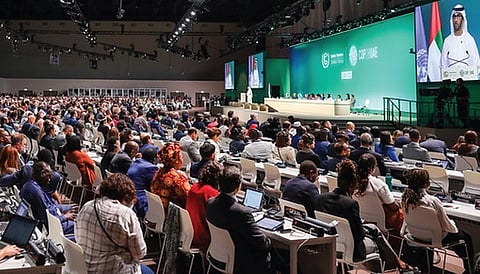

Dubai: On the last day of the United Nations COP28 climate talks on Wednesday, negotiators reached a consensus on the need for a global shift away from fossil fuels, which are contributing to the warming of the planet. However, questions pertaining to the timeline and the funding for this transition remain unanswered.
COP28 President Sultan al-Jaber officially approved the text during a plenary session in Dubai, following over two weeks of discussions where nations aimed to find a solution to keep global warming within 1.5 degrees Celsius (2.7 degrees Fahrenheit) of pre-industrial levels.
The Conference of Parties was divided between those advocating for strict measures to gradually eliminate the use of fossil fuels and others pushing for a solution that would allow the ongoing use of oil, gas, and coal. The latest agreement was proposed early on Wednesday following intense international pressure for more stringent actions than initially suggested.
The new proposal fell short of advocating for a complete phase-out of fossil fuels, a measure that over 100 nations out of 198 had requested. Instead, it proposed a shift away from fossil fuels in energy systems in a fair and organised manner, while also expediting action in this critical decade ahead. This transition aims to guide the world towards achieving net zero greenhouse gas emissions by 2050, in accordance with climate science principles.
Extensive discussions with all representatives continued late into the night on Wednesday following dissatisfaction with the initial document from the conference presidency, which had omitted clear calls for action on reducing global warming, causing frustration among many nations. Subsequently, the presidency led by the United Arab Emirates introduced a new comprehensive document named the Global Stocktake to delegates from almost 200 countries shortly after daybreak.
The 21-page document, which is the third version prepared in about two weeks, does not mention the word oil at all, but it does include the term fossil fuels twice.
The Alliance of Small Island States said in a statement that the text is incremental and not transformational. "We see a litany of loopholes in this text that are a major concern to us. We needed a global signal to address fossil fuels. This is the first time in 28 years that countries are forced to deal with fossil fuels, Center for Biological Diversity energy justice director Jean Su told wire agency AP. "So that is a general win. But the actual details in this are severely flawed," he said.
"The problem with the text is that it still includes cavernous loopholes that allow the United States and other fossil fuel producing countries to keep going on their expansion of fossil fuels," Su said.
"There's a pretty deadly, fatal flaw in the text, which allows for transitional fuels to continue which is a code word for natural gas that also emits carbon pollution,' he added.
